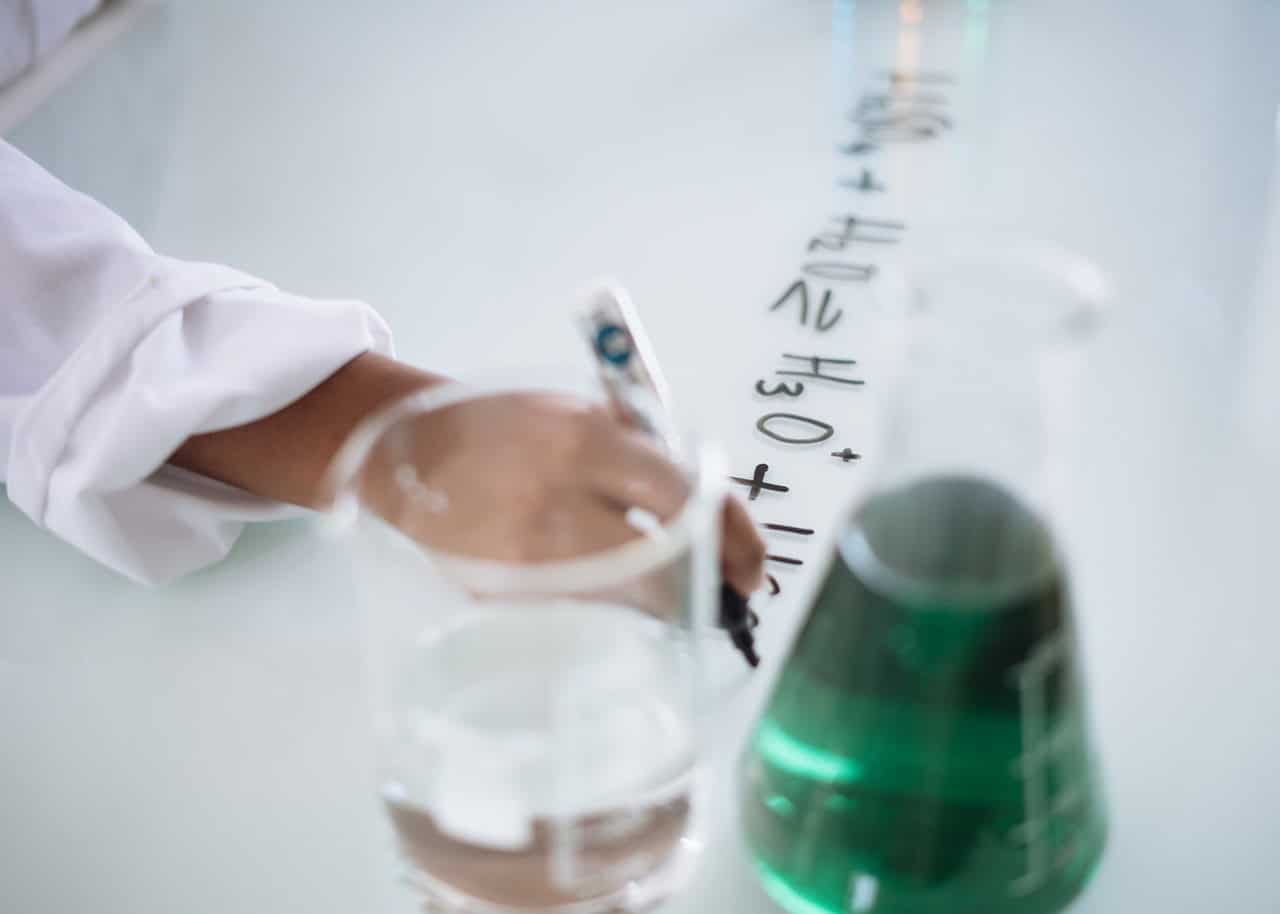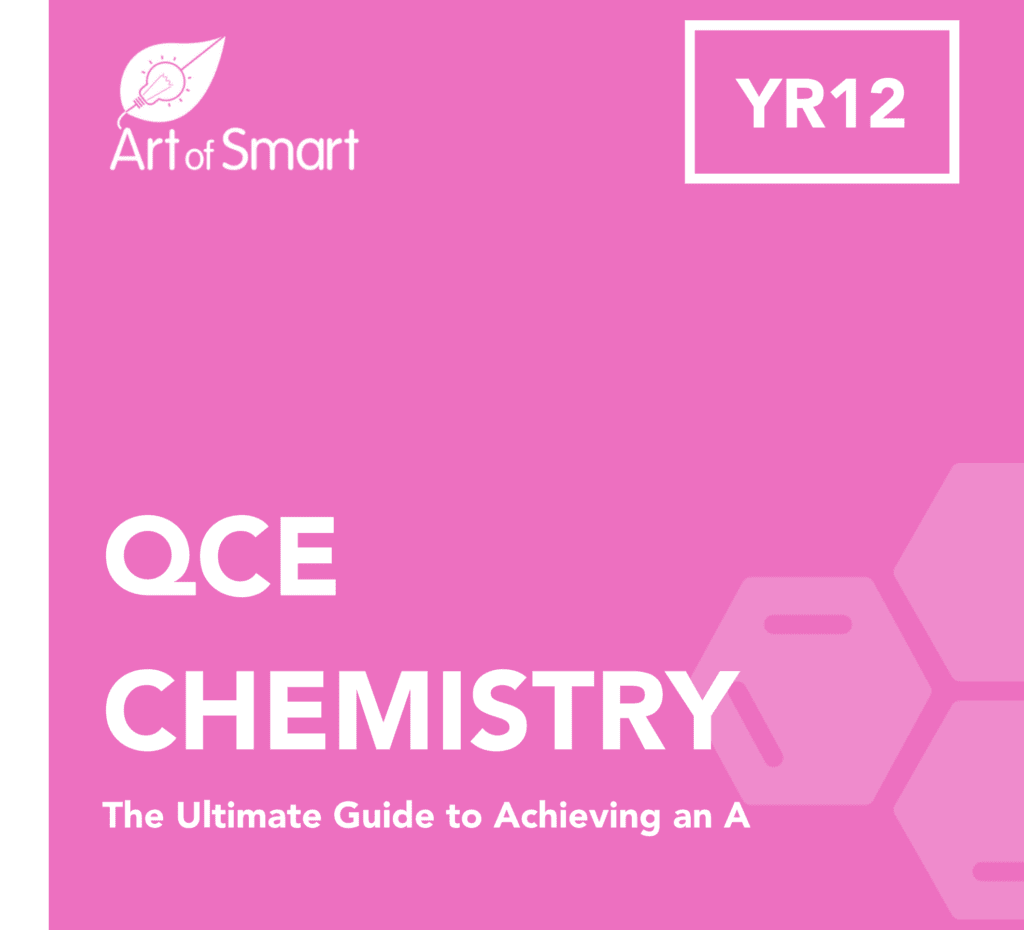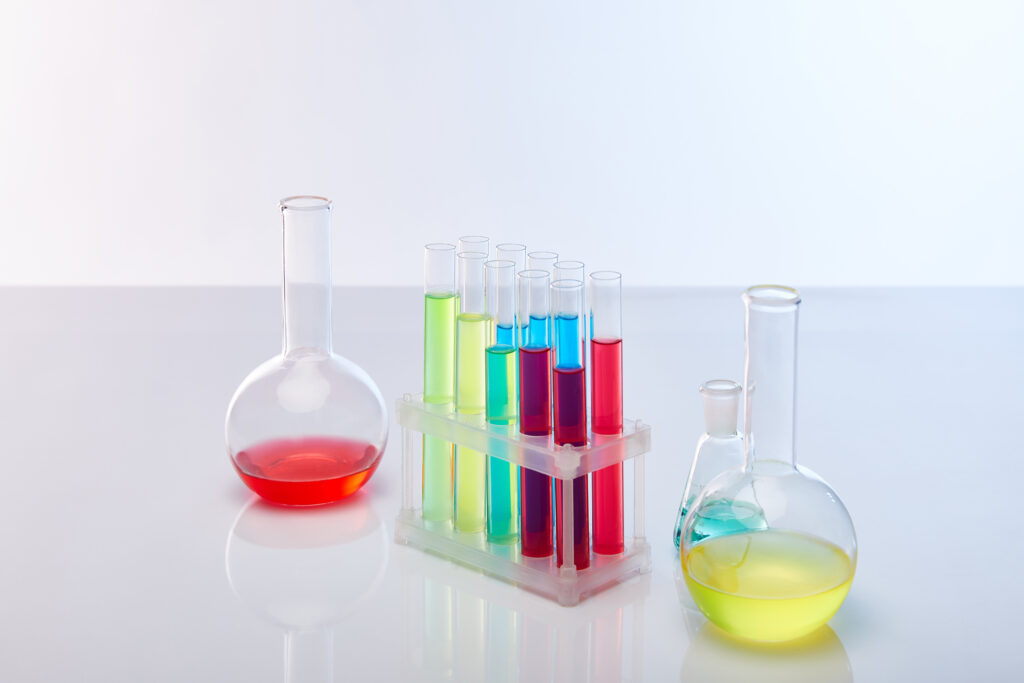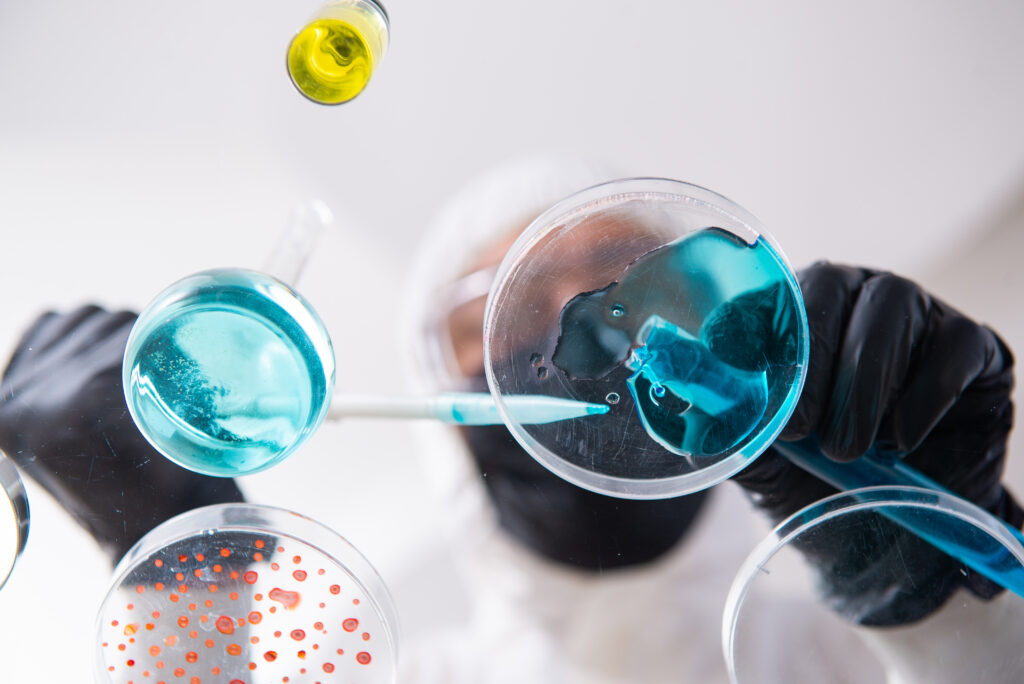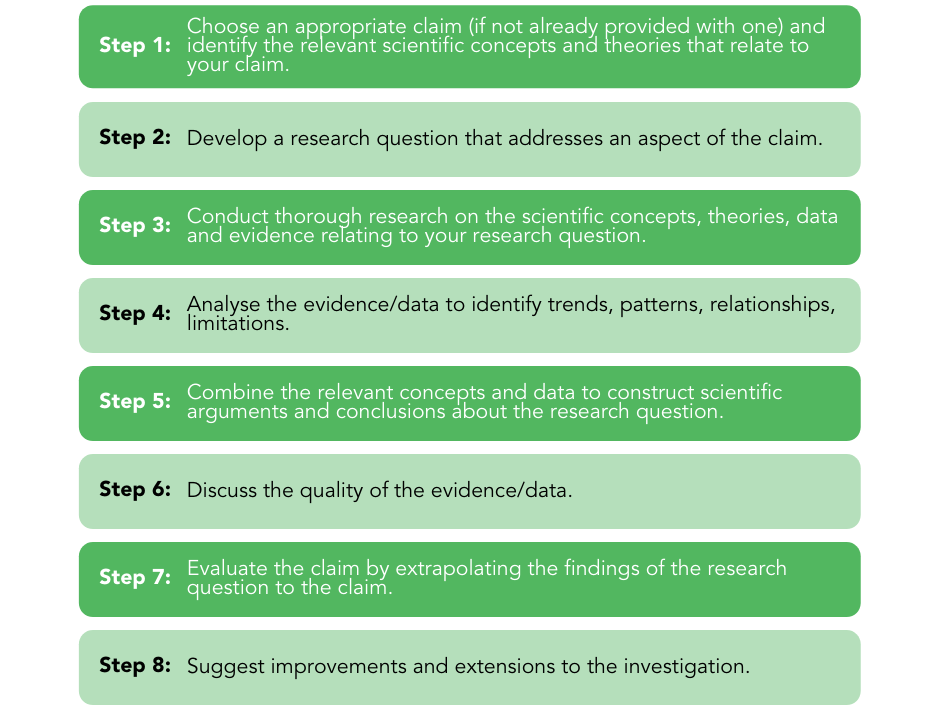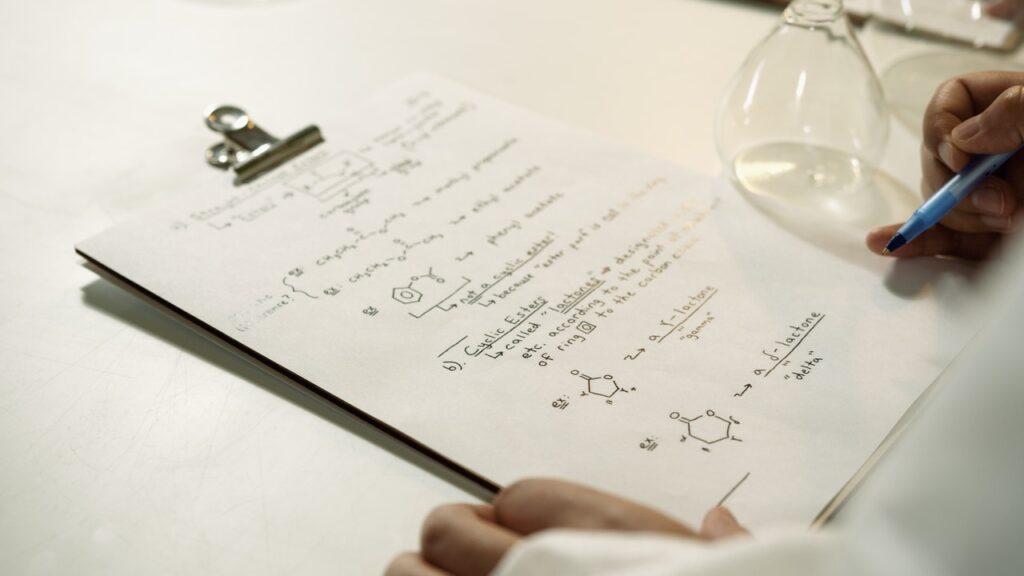As I’m sure you already know, accomplishing an A in QCAA Chemistry is no small feat.
It will require you to work harder, smarter, and maintain your motivation for a much longer period of time than you’ve had to before. But that doesn’t mean it’s impossible!
If you’re worried about how to prepare for the Data Test, or how you’re meant to structure your Research Investigation, I’ve come up with a number of tips, tricks and things you should consider so you can achieve your very best.
Keep scrolling to find out more!
How can you achieve an A in QCAA Chemistry?
IA1: The Data Test
IA2: The Student Experiment
IA3: The Research Investigation
EA: The QCAA Chemistry External Exam
How can you achieve an A in QCAA Chemistry?
Aiming for an A in QCAA Chemistry is no easy task, but it is definitely achievable and we’re here to help!
Working well through your internal tasks and grabbing as many guaranteed marks as you can early on will relieve a lot of stress from your final exam, but also set you up with the right foundations for the more unknown questions you’ll receive.
Our guide below will walk you through each of your assessments, and what’s best is that you can download it for FREE! Check it out below.
IA1: The QCAA Chemistry Data Test
One of your first internal summative assessments will be the Data Test. This assessment is written by your teachers and may take place during Term 4 of Year 11 or the first Term of Year 12 (this is dependent on your school).
It can contain anywhere from 2 to 4 data sets with questions that will require you to interpret data sets in order to produce a short response and/or conduct calculations using appropriate algorithms.
As it’s only worth 10% of your overall grade it may seem relatively insignificant, but it’s never a bad thing to get off to a good start!
Find out what IA1 mark you need to be on track for an ATAR above 90!
Question types generally consist of the following:
- Titration Curve questions: interpreting acid/base curves, completing related stoichiometry questions
- Electrode Potential questions: predicting electrochemical cells, completing related stoichiometry questions
- Equilibrium Curve questions: interpreting equilibrium curves, completing related RICE calculations
Especially considering that your teacher will write the exam, you can expect the Data Test to be one of the more straightforward assessment pieces you will have in QCAA Chemistry.
How can you best prepare for the QCAA Chemistry Data Test?
The main thing to remember about it is that it’s not necessarily testing your knowledge, so it’s not a big deal if you don’t know all the theory inside out. Rather, it’s assessing your ability to apply your understanding of the content to analyse and interpret data to identify trends and draw conclusions.
This means that the best way to be ready for the Data Test is by doing practice questions and practice tests. There isn’t much variation in the types of questions you could see on your data test, so for this exam, practice could actually make perfect (100% scores are not as rare as you’d think!).
If you’re looking for Data Test practice questions or a practice Data Test to complete, check out the QCAA Unit 3 Chemistry Data Test IA1 – Practice Questions!
IA2: The QCAA Chemistry Student Experiment
When completing this assessment, you’ll find that the Student Experiment is essentially a research report based on an experiment that you have conducted. The purpose of a Student Experiment is to refine, extend and/or redirect an existing experiment in order to answer a new, but still related, research question.
Once the experiment has been conducted and the required data has been gathered, the data is then processed, analysed and, if possible, used to draw conclusions to answer your research question. What you discover through your experiment and through research and analysis will be presented in the form of a scientific report which will be 1500-2000 words in length.
It’s worth a decent chunk of your overall grade (20%), but it is absolutely possible to get those top marks.
Read why Term 2 is the most important term of the QCE for many Year 12 students
How can you best prepare for the Student Experiment?
The good thing about the Student Experiment is that it is, in essence, very similar to the general science experiment reports you would have done in previous years. The structure in particular is quite generic, which always makes a task much easier to start.
Coming up with a well refined, extended and/or redirected experiment that will allow you to successfully collect meaningful and accurate data and really set you up for success. Accurate and consistent data will enable you to identify trends, patterns and relationships that insightful conclusions can be drawn from.
The rationale, modifications to methodology, identification of trends/patterns/relationships, identification of uncertainty and limitations, discussion of the validity of the experimental process, and suggested improvements and extensions sections are the biggest opportunities to gain marks in this assessment.
Be thorough with your explanations and provide theories, formulas, and other forms of evidence whenever possible to support your argument!
For more information on how to write your Student Experiment, check out The Definitive Guide to Writing a Student Experiment Report for QCAA Chemistry.
IA3: The QCAA Chemistry Research Investigation
The Research Investigation is a scientific essay in which you evaluate a given claim. This is achieved through researching, analysing and interpreting secondary evidence to form a justified conclusion about the claim.
Your secondary sources must be scientifically credible, and can include research articles, scientific news articles, data compilations, educational resources and more.
The findings of your experiment and all the research and analysis you’ve conducted is presented in the form of a 1500-to-2000-word scientific essay. Just like the Student Experiment, it’s worth 20%!
How can you best prepare for the Research Investigation?
The Research Investigation and Student Experiment are actually quite similar in their purpose. For both assessment pieces you’ll develop a research question, which your report will be based on.
But instead of collecting the data yourself, for your Research Investigation you’ll be sourcing evidence from high quality sources to identify trends/patterns/relationships, identify limitations, discuss the quality of the evidence, and suggest improvements and extensions to your investigation.
The Research Investigation is also slightly less structured, which can mean that it’s trickier to write but it will give you more freedom.
The Research Investigation should tie in with a topic you’ve been learning in Unit 4 QCAA Chemistry: Structure, Synthesis and Design!
Again, having a specific and relevant research question that will also allow you to collect strong evidence will be crucial. Sourcing your information from credible and relevant sources will also be important to the validity of your evidence and thus your interpretations and discussion.
Another big tip is to link everything back to the research question, especially your evidence. And if you’re finding it tricky to do so, then maybe it’s not so relevant.
You can check out these simple steps we’ve created to write up your Research Investigation:
For a more comprehensive guide on how to write the Research Investigation, see The Ultimate Guide to Conducting a QCAA Chemistry Research Investigation!
EA: The QCAA Chemistry External Exam
You’re almost finished with QCAA Chemistry! One major thing to consider is that the External Exam is worth 50% of your final grade, so it will have a huge impact on it.
This may feel super overwhelming to think about, but if you do the right preparation, you may even think of this as a great opportunity to showcase what you know as opposed to it being a big, scary exam!
How can you best prepare for the External Assessment?
#1: Routinely revise content
Since the exam can cover any and all content from Unit 3 and Unit 4, procrastinating and leaving revision until a few weeks before the exam just won’t work. In order to ace the External Exam, you need to integrate revision time into your study routine.
Not only will routinely revising help you remember previous concepts, but it will make learning new concepts easier as you can make the connections between concepts faster.
Revising content for Chemistry is a walk in the park once you learn how to take effective science study notes!
#2: Treat your mock exam like the real thing
While it is tempting to go easy on yourself during a mock exam, you should really make the most of it! It’s not necessarily for the questions themselves since a lot of mock exams will have very different questions to the final exam.
It’s so that you can understand what you’ll be experiencing on your actual exam day.
Knowing what to expect entering the exam will reduce a lot of your stress. Typically, the most stressful part of your exams is not knowing what to expect.
If you already know what things will be like in relation to timing, your environment, etc. all you need to worry about is the actual questions on the paper!
#3: Do your best in your internal assessments
Make an effort with your internal assessments and secure as many marks as possible! Since your internal assessments are written by your teachers, you’ll have a lot more support in terms of guided revision and the structure of your task — you won’t have that during your External Exam.
Using their guidance to your advantage and putting in as much effort as possible for your internals will be highly beneficial in the long run. Your external exam will be much more unpredictable and you can’t rely on it to boost your overall QCAA Chemistry mark.
For many more tips on how to ace your Chemistry External Exam, check out How to Ace Your External Assessment for QCAA Chemistry!
Start your year by planning your goal ATAR and marks by using our QCE Cohort Comparison Tool!
Practice Questions for QCAA Chemistry
If you’re after practice questions or practice tests for the External Exam, check out some below:
- QCAA Practice Questions for Unit 3 & 4 Chemistry External Assessment
- QCAA Multiple Choice Practice Questions for Unit 3 & 4 Chemistry External Assessment
- Download QCAA Chemistry Practice Exam for External Assessment Revision
- The Comprehensive List of QCAA Past Papers, Guides, Tips and Info
On the hunt for QCAA study guides for other subjects?
Check out the study guides we’ve created for the subjects below:
The Ultimate Guide to Unit 4 of QCE Physics can be found on our website too!
Are you looking for some extra help with revising for QCAA Chemistry?
We have an incredible team of QCE Chemistry tutors and mentors!
We can help you master the QCAA Chemistry syllabus and ace your upcoming Maths Methods assessments with personalised lessons conducted one-on-one in your home or online!
We’ve supported over 8,000 students over the last 11 years, and on average our students score mark improvements of over 20%!
In need of a tutor on the Gold Coast? Check out our expert tutoring options on the Gold Coast and our state-first QCE resources!
To find out more and get started with an inspirational QCE tutor and mentor, get in touch today or give us a ring on 1300 267 888!
Yalindi Binduhewa is an Art of Smart tutor based in Queensland and was part of the very first cohort to go through the ATAR system, so she knows exactly how fun and enjoyable it can be. She is currently studying a Bachelor of Medical Imaging (Honours) at QUT and is loving it. When she’s not doing uni-related stuff or tutoring, she’s hanging out with her friends, rewatching a show for the 100th time, or trying out new crafty projects and discovering that she doesn’t have a talent for everything.

